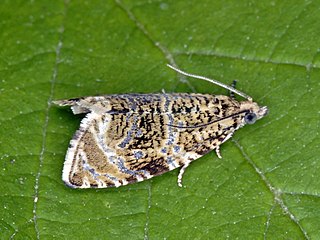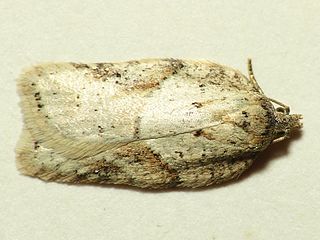
Celypha cespitana is a moth of the family Tortricidae. It is found in the Palearctic realm, from western Europe to the Ural Mountains, Transcaucasia, Asia Minor, the Near East, Iran, Russia, north-eastern China (Manchuria), Korea and Japan. It is also found in the Nearctic realm.

Syricoris lacunana, the dark strawberry tortrix, is a small moth species of the family Tortricidae. It is found in the Palearctic realm.

Celypha rufana, common name lakes marble, is a small moth species of the family Tortricidae, long known under the junior synonym C. rosaceana.

Celypha aurofasciana is a small moth species of the family Tortricidae. It is native to Europe and the Palearctic but occurs in some other places as an introduced species.

Celypha is a genus of tortrix moths. It belongs to the tribe Olethreutini of subfamily Olethreutinae.

Syricoris is a genus of moths belonging to the subfamily Olethreutinae of the family Tortricidae.

The Olethreutini are a tribe of tortrix moths.

Celypha rivulana is a small moth species of the family Tortricidae. It is found in most of Europe.

Tortricodes alternella is a species of moth of the family Tortricidae. It is found in most of Europe, except most of the Balkan Peninsula.

Depressaria olerella is a moth of the family Depressariidae. It is found in most of Europe, except Ireland, the Netherlands, the Iberian Peninsula and most of the Balkan Peninsula.

Carpatolechia alburnella, the suffused groundling, is a moth of the family Gelechiidae. It is found from most of Europe to Siberia. The habitat consists of woodland and heathland.

Chionodes continuella is a moth of the family Gelechiidae. It is found from most of Europe, east to Japan. It is also present in most of North America.
Inape celypha is a species of moth of the family Tortricidae. It is endemic to Ecuador.

Acleris logiana, the black-headed birch leaffolder moth or grey birch button, is a moth of the family Tortricidae. It was described by Carl Alexander Clerck in 1759. It is found in most of Europe, except Ireland, Portugal, most of the Balkan Peninsula and Ukraine. It is also found in North America, the Russian Far East, Korea and Japan.

Celypha rurestrana, the hawkweed marble, is a moth of the family Tortricidae. It was described by Philogène Auguste Joseph Duponchel in 1843. It is found in most of Europe, except Ireland, Lithuania, Ukraine and the western part of the Balkan Peninsula. It is also found in Turkey.

Triaxomera fulvimitrella, the four-spotted clothes moth, is a moth of the family Tineidae. It is found in most of Europe, except Ireland, the Iberian Peninsula, Italy, Slovenia and most of the Balkan Peninsula. The habitat consists of woodlands.
Celypha ermolenkoi is a species of moth of the family Tortricidae. It is found in Ukraine, on the Crimea and in Kyrgyzstan.

Notocelia tetragonana, the square-spot bell, is a species of moth of the family Tortricidae. It is found in China, Russia and Europe, where it has been recorded from most of the continent, except the Iberian Peninsula, the Netherlands, Denmark and most of the Balkan Peninsula. The habitat consists of woodland and scrubland.

Celypha woodiana also known as the mistletoe marble is a moth of the family Tortricidae found in Europe. In Great Britain the moth is a priority species in the United Kingdom Biodiversity Action Plan. The species was described by Charles Golding Barrett who named it in honour of John Henry Wood.

Celypha capreolana is a moth belonging to the family Tortricidae.

















